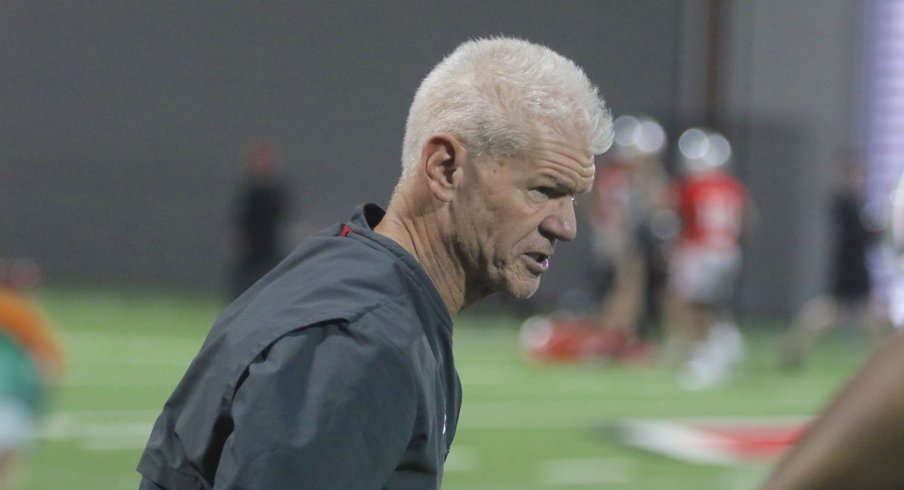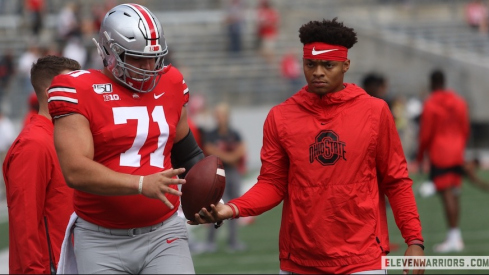Even in the spring, football is alive and well in Columbus. With interviews and open practices, Buckeye football is always available, even in the offseason.
Spring practices, while not as exciting as the summer or fall ones, are probably the most important, offering coaches an opportunity to introduce schemes and techniques and help determine who has the leg-up in key position battles. The season culminates in the spring game, letting the best of the best compete against each other.
This year will have none of that.
Coronavirus fears have canceled all spring athletic activities from recruiting to full-contact practice. Throughout these cancellations, each Big Ten East program will fare differently. Overall, the teams with the most continuity have the least to fear while teams without a starting quarterback, a new coaching staff, or recruiting woes will suffer.
Indiana: Quarterback Depth
The Hoosiers were one of the biggest surprises in the Big Ten last year, going 8-5 and staying over .500 in the conference. A major reason for that was Indiana's quarterback play, which was led by redshirt freshman Michael Penix Jr.. Penix was often injured, however, leading to a breakout year by Peyton Ramsey, who became Pro Football Focus' third-highest rated Power Five quarterback in the last eight weeks of the season.
Ramsey has since transferred to Northwestern, however, depleting the depth behind the injury-ridden Penix, and finding his replacement has become much more difficult with the cancelation of spring activities. Jack Tuttle, a transfer from Utah, is the obvious answer, but the redshirt sophomore is relatively untested and likely needed a full offseason with the Hoosiers to become acclimated to Bloomington, an opportunity he no longer possesses.
Tom Allen was able to keep most of his staff and replace those that did leave with capable coaches, but his team's most glaring need will become even more apparent without spring practice.
Maryland: Depth in the Backfield, Acclimating Talented New Recruiting Class
After a disappointing 2019 season that saw the Terps go 3-9, things got worse before they got better with a number of key departures. Maryland lost a scholarship quarterback to the transfer portal and another one medically retired, leaving the Terrapins with just two scholarship quarterbacks on the roster. Additionally, junior Javon Leake and senior Anthony McFarland Jr., the team's two leading rushers, each declared for the NFL Draft this offseason.
Despite Maryland's poor season, Mike Locksley reined in the 31st-ranked recruiting class in 2020. With practices canceled for the foreseeable future, it will be difficult to get his talented group, which includes two four-stars, onto the field and ready to contribute by September. Getting the new class on the field is important for every team, but it is especially crucial for Maryland; the Terps had the fourth-worst roster in the conference coming into the 2019 offseason.
Locksley's newest recruiting class should help the program in the future, but for now, the spring cancelations may prove to be too much for the second-year head coach.
Michigan: Quarterback Situation
Since Jim Harbaugh's arrival prior to the 2015 season, the Wolverines have yet to have a legitimate, home-grown talent under center, relying on transfer Shea Patterson for the past two years. With Patterson's departure, Jim Harbaugh is once again left without a quarterback.
The ensuing position battle will likely be between redshirt junior Dylan McAffrey and redshirt sophomore Joe Milton, both of whom were four-star recruits. McAffrey has more playing experience and was named as the possible second fiddle in a two-quarterback system. Milton is a big, strong-armed quarterback that appeared against the Buckeyes in 2018.
Because of the position's importance, Harbaugh's program will be a tough spot without a clearly defined leader at the quarterback position. With the loss of spring practices, it becomes even more likely that Michigan's signal-caller is ill-prepared at the start of the 2020 season.
Michigan State: New Coaching Staff
In one of the weirdest stories of the offseason, Mark Dantonio stepped down as Michigan State's head coach after 13 seasons. The program then had to scramble to find a new coach in February, eventually landing Mel Tucker after striking out with Luke Fickell.
Tucker was just 5-7 last year as a first-year head coach in Colorado. Now, he is joining one of the most competitive divisions in college football and will lose all of the spring practices to help his team get on-board with his system. Tucker also likely has a quarterback competition to conduct, as Dantonio discussed the possibility of bringing in a transfer at the position.
Michigan State will likely take another step back in 2020 as it comes into the season underprepared with an inexperienced head coach under strenuous circumstances. With his late hire, recruiting dead period, and cancellation of spring activities, there is little Tucker can do to improve his program until athletic activities can resume.
Ohio State: Replacing Hafley's Defense
Jeff Hafley, now the head coach at Boston College, was a major part of the Buckeyes' defensive transformation last year and his departure is a blow to the program. By bringing in Kerry Coombs, Ohio State has its third secondary coach in three years and will be trying to replicate last season's success.
With no spring practices, the dismissal of Amir Riep and Jahsen Wint, and just one returning starter in the defensive backfield, that task just became a lot more difficult. The Buckeyes will not have the practice time needed to fine-tune the new defensive scheme or have competitions for starting spots.
Ohio State, however, will still be in better shape than most of the other teams in the conference once practices can resume. The Buckeyes have a clear starting quarterback and offensive system, recently picked up a new slate of commitments from recruits, and lost only two major coaches in the offseason.
Penn State: Recruiting
With most of the coaching staff returning and Sean Clifford returning as the team's starting quarterback, Penn State looks to be one of the most stable teams in the conference throughout these cancellations. The program's biggest issues, however, come in assembling next year's class of Nittany Lions; Penn State holds just two commitments in the 2021 cycle.
While James Franklin can still make up some ground, it will be difficult to do so during the recruiting dead period. Penn State has been linked to a number of marquee recruits but has not been able to land any more commitments.
Penn State will likely be fine for the upcoming season and will likely bounce back in recruiting this summer, but the dead period and cancellations will undoubtedly be a cause of stress for the program's coaching staff.
Rutgers: New Coaching Staff, Recruiting
Let's face it: Rutgers was in a tough spot before spring practice was canceled. After rehiring Greg Schiano, the program has more optimism surrounding it than it has had in recent memory. With a new coaching staff, however, comes growing pains and the team and Schiano simply will not have the opportunity to work through these obstacles and become acclimated with each other.
Additionally, the recruiting dead period will be another blow to Rutgers. The program holds just three commitments from recruits in the 2021 class and Schiano will not be able to make up much more ground this spring. Rutgers will almost certainly improve upon its poor 2019 season under its most successful coach since the 1970s but the program's progress will be severely limited by the new restrictions.


